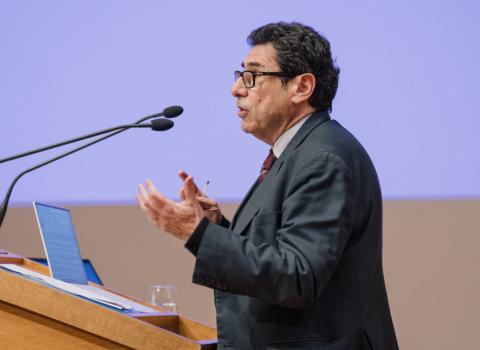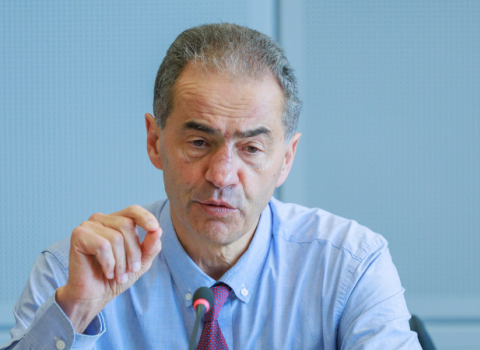Scientists don’t usually get on their tractors to lobby, but ERC president Maria Leptin wants them to go out and speak to politicians and citizens to explain why investing in research and innovation is important

Maria Leptin, president of the European Research Council. Photo: Jennifer Jacquemart / European Union
Maria Leptin, president of the European Research Council (ERC), has called on ERC grant holders to lobby politicians to double the research budget in the next Framework programme, FP10.
“As scientists, we do not tend to get on our tractors to lobby and tell the world about our achievements and the value of our work,” Leptin said in a letter to grantees earlier this month, referencing recent farmer-led protests across the EU.
“But you could help by going out to speak with politicians and citizens to explain why investing in research and innovation in general, and frontier science in particular, is important. Only with a sustained and concerted effort will we be able to ensure that Europe remains competitive,” said Leptin.
ERC wants the budget of the 2028 – 2035 research Framework programme (FP10) to be double that of the current Horizon Europe programme, which is €95.6 billion. This is in line with the stance taken by some MEPs, research and innovation stakeholders and industry associations.
“As concerns funding, the ERC is clearly struggling,” Leptin said. As things stand ERC is only able to fund around 60% of proposals that meet its excellence threshold and grant sizes have remained the same over the 17-years since ERC was set up, with no adjustment for inflation.
When the ERC was established, its ideal budget was calculated at €2 billion annually, but only now has it reached that level. “It should have gone up,” Leptin told Science|Business in an interview last month.
The Association of ERC grantees responded positively to Leptin’s letter, saying, “We emphasise the crucial need for supporting targeted research and innovation and advocate for a comprehensive increase in the EU research budget.”
Leptin’s letter is further evidence that researchers are waking up to the need to lobby and fight for a bigger budget. MEP Christian Ehler, a leading voice in the Parliament on research and innovation policy, is also asking scientists and researchers to make their voices heard.
“Get out of this moral superiority of the victim,” Ehler said during Science|Business’ annual conference earlier this month. “This is a stakeholder community, which [isn’t] used to lobbying, because they thought, since the time of the Enlightenment, somehow, the princeps [are] donating something for research. This time is over.”
The European Council recently agreed a deal to cut €2.1 billion from Horizon Europe’s 2025 - 2027 budget as part of wider negotiations on EU spending. And with more attention and resources swinging towards security and defence, purse strings are not necessarily going to get any looser for the scientific community. The EU’s research commissioner, Iliana Ivanova, acknowledged as much when speaking to MEPs last month.
“If I am asked what is my top priority that I want to succeed in the remaining months of my term, I would say that I would like to convince the member states and the decision makers of the strategic importance of the investments into research and innovation” Ivanova said.
“We are at serious risk of [lagging] behind,” she added. “In the Council, as we know the latest news is not that optimistic […]. I will not stop making the case of the strategic importance of R&I. I will of course insist on a higher budget.”
Since then, Ivanova and national research ministers agreed to commit to safeguarding the FP10 budget from the cuts Horizon Europe has faced. France’s research minister Sylvie Retailleau told Science|Business that FP10 needs to have a stable and predictable budget.





 A unique international forum for public research organisations and companies to connect their external engagement with strategic interests around their R&D system.
A unique international forum for public research organisations and companies to connect their external engagement with strategic interests around their R&D system.